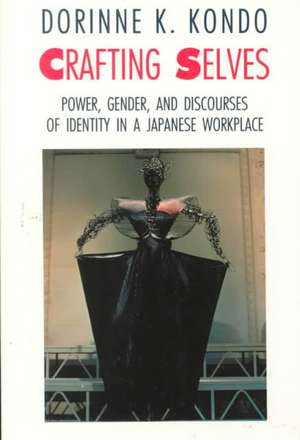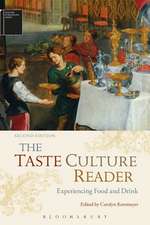Crafting Selves: Power, Gender, and Discourses of Identity in a Japanese Workplace
Autor Dorinne K. Kondoen Limba Engleză Paperback – 15 apr 1990
"The ethnography of Japan is currently being reshaped by a new generation of Japanologists, and the present work certainly deserves a place in this body of literature. . . . The combination of utility with beauty makes Kondo's book required reading, for those with an interest not only in Japan but also in reflexive anthropology, women's studies, field methods, the anthropology of work, social psychology, Asian Americans, and even modern literature."—Paul H. Noguchi, American Anthropologist
"Kondo's work is significant because she goes beyond disharmony, insisting on complexity. Kondo shows that inequalities are not simply oppressive-they are meaningful ways to establish identities."—Nancy Rosenberger, Journal of Asian Studies
"Kondo's work is significant because she goes beyond disharmony, insisting on complexity. Kondo shows that inequalities are not simply oppressive-they are meaningful ways to establish identities."—Nancy Rosenberger, Journal of Asian Studies
Preț: 257.90 lei
Nou
Puncte Express: 387
Preț estimativ în valută:
49.35€ • 51.66$ • 40.83£
49.35€ • 51.66$ • 40.83£
Carte tipărită la comandă
Livrare economică 05-19 aprilie
Preluare comenzi: 021 569.72.76
Specificații
ISBN-13: 9780226450445
ISBN-10: 0226450449
Pagini: 354
Ilustrații: 1ill.
Dimensiuni: 152 x 226 x 28 mm
Greutate: 0.51 kg
Ediția:1
Editura: University of Chicago Press
Colecția University of Chicago Press
ISBN-10: 0226450449
Pagini: 354
Ilustrații: 1ill.
Dimensiuni: 152 x 226 x 28 mm
Greutate: 0.51 kg
Ediția:1
Editura: University of Chicago Press
Colecția University of Chicago Press
Cuprins
Acknowledgments
Note on Romanization
Part One: Settings
1. The Eye/I
The "Setting" Trope
How the Problem Emerged
Japanese Selves and Their Challenge to the "Whole Subject"
Displacing the Binary: Anthropological Studies of The Self
2. Industries, Communities, Identities
The Industrial Context, Firm Size, and Identity
Shitamachi and Yamanote
3. Disciplined Selves
The Ethics Retreat
A Day at the Center
Special Events
Theories of Selfhood: The Dialectic of Form and Feeling
Japanese Selves and the Ethics Doctrines
Part Two: Family as Company, Company as Family
4. Circles of Attachment
Households: Ie as Obligation
Circles of Attachment: Uchi as Feeling
5 Adding the Family Flavor
Merchants and Artisans: The Familial Embrace
The Satö Company: Company as Family?
So Does It Work?
Yoso: The Company Networks
6. Company as Family?
Uchi no Kaisha: Contested Meanings Resistance?
Part Three: Gender and Work Identities
7. The Aesthetics and Politics of Artisanal Identities
Meaning, Power, and Work Identities
Artisanal Idioms of Work: A collective Story
Work and the Material World
Hierarchy, Exclusion, and an Idiom under Siege
The Aesthetics and Politics of Identity
8. Uchi, Gender, and Part-Time Work
Stories of Work
The Discursive Field
Work and Its Meanings
Commitment to Uchi: Company or Family?
Gendered Identities and the Workings of Power
9. The Stakes
Notes
References
Index
Note on Romanization
Part One: Settings
1. The Eye/I
The "Setting" Trope
How the Problem Emerged
Japanese Selves and Their Challenge to the "Whole Subject"
Displacing the Binary: Anthropological Studies of The Self
2. Industries, Communities, Identities
The Industrial Context, Firm Size, and Identity
Shitamachi and Yamanote
3. Disciplined Selves
The Ethics Retreat
A Day at the Center
Special Events
Theories of Selfhood: The Dialectic of Form and Feeling
Japanese Selves and the Ethics Doctrines
Part Two: Family as Company, Company as Family
4. Circles of Attachment
Households: Ie as Obligation
Circles of Attachment: Uchi as Feeling
5 Adding the Family Flavor
Merchants and Artisans: The Familial Embrace
The Satö Company: Company as Family?
So Does It Work?
Yoso: The Company Networks
6. Company as Family?
Uchi no Kaisha: Contested Meanings Resistance?
Part Three: Gender and Work Identities
7. The Aesthetics and Politics of Artisanal Identities
Meaning, Power, and Work Identities
Artisanal Idioms of Work: A collective Story
Work and the Material World
Hierarchy, Exclusion, and an Idiom under Siege
The Aesthetics and Politics of Identity
8. Uchi, Gender, and Part-Time Work
Stories of Work
The Discursive Field
Work and Its Meanings
Commitment to Uchi: Company or Family?
Gendered Identities and the Workings of Power
9. The Stakes
Notes
References
Index






